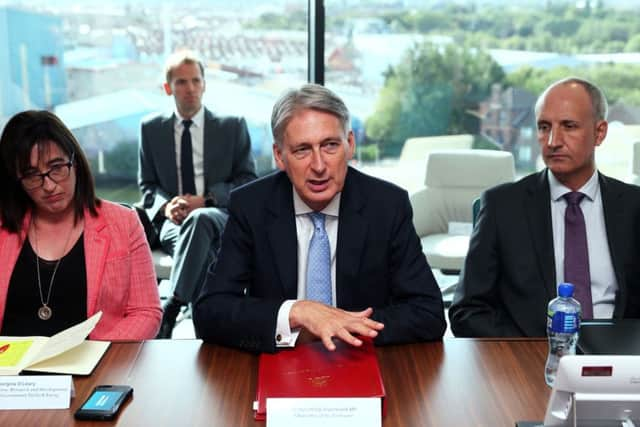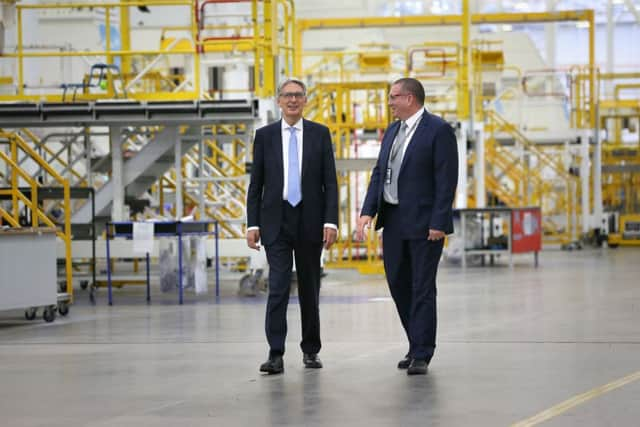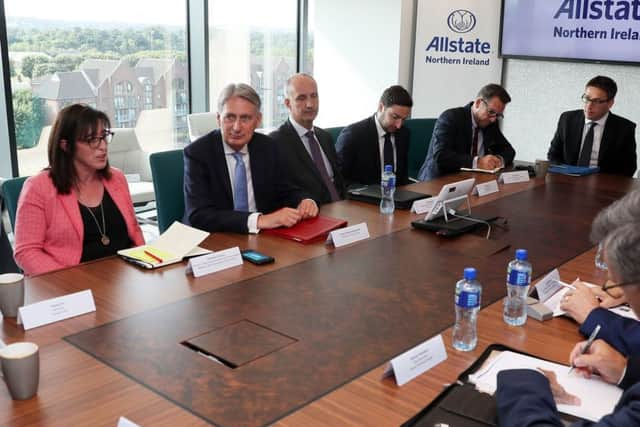Preventing a border in the Irish Sea is '˜non-negotiable' for UK in Brexit talks, says chancellor
and live on Freeview channel 276
Philip Hammond told the News Letter that it was taking time for Brussels to realise that while London was committed to no hard Irish land border, it was also insistent on protecting the integrity of the United Kingdom.
Speaking on a visit to Bombardier in Belfast, he said: “One of the challenges we have had over the last few months is getting the EU to understand that the no east/west border is as non-negotiable a part of this picture as no north/south border is for them.”
Advertisement
Hide AdAdvertisement
Hide AdMr Hammond’s comments are significant because he is seen as the most influential and pro-European of the politicians in the current cabinet who campaigned for the UK to remain in the EU in the 2016 referendum.


During the visit to Bombardier’s factory, he announced that the company will receive almost £12 million of new government funding to secure jobs at the site.
The chancellor toured Bombardier’s production line, and welcomed new orders of 60 A220s (formerly CSeries) announced last week at Farnborough Airshow, after chairing a financial services round table in Belfast. He then travelled to Londonderry.
Asked about the fraught land border issue, which has been one of the biggest disagreements in the EU-UK talks, Mr Hammond said the commitment to avoid a hard frontier is one “that we’ve made unilaterally and freely but it also a commitment that the EU has made”.
Advertisement
Hide AdAdvertisement
Hide AdIn further comments about the long-running border dispute, Mr Hammond added: “Remember that Michel Barnier himself was involved – from the EU’s side – in the original agreements, so there is a strong sense of ownership, on both sides, of the success of the Belfast Agreement and a determination to ensure that that success is maintained so we have to keep that border open.


“We have to avoid the imposition of an east/west border down the Irish Sea. Those are two non-negotiable elements from the UK side.”
Mr Hammond said that “progress on putting in place the Irish backstop arrangements [on avoiding a hard land border] are a crucial part of the overall package”.
But he reiterated the point about the Irish Sea: “The no east/west border is equally non-negotiable from the point of view of a British Conservative and Unionist. I certainly wouldn’t be prepared to sign up to any solution that involved an east/west border between Northern Ireland and GB.”
Advertisement
Hide AdAdvertisement
Hide AdMr Hammond’s remarks give weight to something that Dominic Grieve, the staunchly pro-Remain MP, told this newspaper in June that almost all his Tory colleagues opposed an internal UK border. Mr Grieve said a border in the Irish Sea “can’t happen because if it were to happen the government would fall. Do bear in mind that even somebody like me, who is a Remainer, could never accept such an arrangement”.


Mr Hammond, who was fielding questions from press journalists from the News Letter, Irish News and Irish Times, said that he had travelled to Northern Ireland for his one-day trip yesterday “to see what is happening here at Bombardier”.
The government, he said, had been heavily involved in lobbying the US when the Americans threatened to impose huge trade tariffs on Bombardier jet sales to Delta Airlines, a move that was later overturned by the International Trade Commission in the US.
Mr Hammond said: “I think what has happened in the end is a very good outcome for this plant and secures its future and of course the announcement that we have made today that we will support the development of the new thrust reverser.”
Advertisement
Hide AdAdvertisement
Hide AdThe chancellor said that he had “sensed a frustration and I think a concern” from the business leaders he had met during yesterday’s round table that if the political stalemate at Stormont were to continue it could exact “a toll on inward investment and confidence by foreign firms who are invested here”.
Commenting on the need to maintain the political progress achieved in Northern Ireland since the 1998 Belfast Agreement, he said: “I used to work here in the late 1970s [in medical electronics] and I can tell you that this city looks nothing like, feels nothing like, it did, and the sense of prosperity and prospects for the future is just transformative.
“The idea that people would even think about allowing it to slide backwards is just intolerable.”
Mr Hammond also insisted that Britain will be able to strike its own trade deals under the proposed version of Brexit agreed at Chequers this month. He rejected criticism of the plan from Brexiteers, who say that EU rules and regulations will make such trade almost impossible.
Advertisement
Hide AdAdvertisement
Hide AdHe said: “I reject the idea that the white paper proposal [on Brexit] wouldn’t allow Britain to have an independent trade policy. It clearly would.
“It is a very carefully structured proposal with a complex arrangement that will allow differential tariffs to be put in place. Now we have been quite clear that that won’t happen overnight, it would have to be phased in, over time, but it will give us the option of entering into trade deals with third countries based on tariff-free access to our market.”
Asked if the saga between Bombardier and Boeing showed that trade would in any event be hard post Brexit, amid the rise of protectionism under President Donald Trump, Mr Hammond said: “Well, trade deals are complex to strike and it has to be remembered that a trade deal is a two-way pipe.
“It doesn’t just open up export markets for us, it also exposes our domestic manufacturers and producers, including potentially agricultural producers, to competition from our trade partner.”
Advertisement
Hide AdAdvertisement
Hide AdAnd asked about comments by David Trimble on the BBC yesterday that any attempt by the Irish government to impose tariffs on trade with the UK would lead to an upsurge in smuggling, the chancellor said: “We already have a different excise regime of course from the Republic and it would be naive and disingenuous of me to imagine that no smuggling takes place, but we have an effective method of managing cross-border excise issues based on collaboration between the PSNI and Garda and using an intelligence-led approach rather than accrued physical border-based approach.
“That works well, I think, for excise protection. In any excise regime, any duty-based regime, there will always be some avoidance, just as there is at Dover-Calais.”
During his visit to Belfast, Mr Hammond said that financial services is not merely a major part of London’s economy, but is important across the UK.
The chancellor was speaking after the round table meeting yesterday morning with businesses on his visit to Belfast.
Advertisement
Hide AdAdvertisement
Hide Ad“I have done a financial services round table this morning,” he said. “Financial and business services across Northern Ireland employs about 33,000 people. Financial services in Northern Ireland is a very important part of the overall UK financial services business.
“It is all too often forgotten that financial services employment is spread right across the UK.
“The City, in quotes, is not just based in London. More than three-quarters of all employment in financial services is outside London and there is a very vibrant financial services and fintech [financial technology] business sector here in Northern Ireland so there is a chance to get together with the leaders of that industry and talk to them about the UK-wide issues from a Northern Ireland perspective but also to talk about some of the specific Northern Ireland issues.”
Mr Hammond said that the “absence of a government in the Province is one of the key issues that concerns business leaders here”.
Advertisement
Hide AdAdvertisement
Hide AdSpeaking about the £12m package for Bombardier to support development of the new thrust reverser, Mr Hammond said it “underscores the strong future for this plant”.
The chancellor said there is “an expectation of a big increase in output volume here over the next few years and the plant becoming an embedded part of the Airbus supply chain, which I think is a very good place for it to be”.
Mr Hammond then travelled to Londonderry where, during a visit to the Ulster University campus, he said the government would consider an application from the Maiden City for a city deal.
Politicians in Northern Ireland’s second city were angered last year when Mr Hammond’s Budget contained a city deal package for Belfast but not Londonderry.
Advertisement
Hide AdAdvertisement
Hide Ad“Northern Ireland is leading the way within the UK in productivity growth,” Mr Hammond said. “I want to support this progress by inviting a bid for a Derry-Londonderry City Deal, an opportunity for the region to continue to drive forward economic growth and build an economy that works for everyone.”
• See Morning View